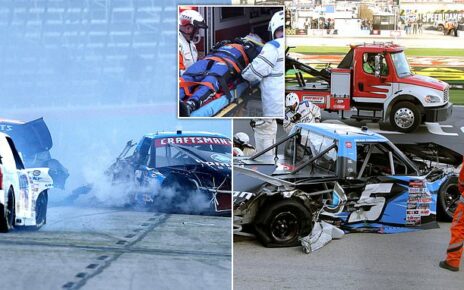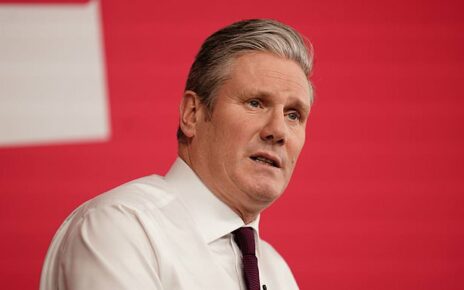The 100 days countdown until the state election began with a bold, mid-week gambit from rejuvenated Opposition Leader Matthew Guy.
Finally getting his policy agenda to be the headlines instead of internal scandals and a staff exodus, Guy put the Andrews government on the backfoot over the seemingly bottomless budget for the Suburban Rail Loop and what are proving to be intractable hospital delays.
Matthew Guy says he will scrap the Suburban Rail Loop if elected.Credit:Scott McNaughton
Curiously, Guy needlessly linked the two, connecting the significant cost over-runs for Australia’s biggest infrastructure program to Victoria’s ongoing hospital and ambulance failings.
Telling the voters that they have to choose between trains and hospitals meant the opposition split the public reaction. Everyone wants the health mess fixed – but not everyone wants the construction of the train tunnelling to stop.
While getting a sugar hit by linking the two, Guy left his bold announcement vulnerable to being unpicked.
Initially, Guy claimed that stopping work on the suburban rail link would divert $35 billion towards building new hospitals. He said he would resume the tunnelling once the hospital crisis was fixed.
Under scrutiny, he quickly backpedalled to admit that his plan would only redirect about a third of that amount back into the health budget, and that existing rail construction contracts had to be honoured.
The government pounced, claiming his elevation to government risked triggering massive job losses through the construction sector.
Anyone who knows anything about building infrastructure – and I don’t know much but I know this – is aware that a stop-start approach to construction is disastrous. Major projects’ lead times are massive and the complexity is daunting.
What seems to be simple – removing a level crossing – can involve moving sewers, water mains, under and above ground power, internet and phone cables and gas pipelines. Every moving part affects every other component.
For long-tail projects that take decades to build, Victoria must attract, train and retain a dedicated specialist workforce which, once hired, must have a “pipeline” of work. If construction is stopped, the workforce leaves. The economic activity falters and the result is boom-bust.
Engineers and related professionals are in demand around the nation and globally. Once they are gone, it is incredibly hard to get them back.
Tampering with a big-build project midway, to solve an unrelated policy or budget problem, is tantamount to vandalism.
There is an undeniable urgency in solving hospital and ambulance delays. Patients are suffering, medical staff are exhausted and frustrated. If it was easy, it would have been done already.
Elections can be won and lost on nothing else. In our own recent past, Steve Bracks came to power not just because of the autocratic style of Jeff Kennett but because of an ambulance service scandal.
Letting the problems get to crisis stage is inexcusable.
But is it even a good idea to redirect tunnel money to build more hospitals? At first blush, it seems tempting but closer scrutiny reveals more questions than answers.
If the existing hospitals are struggling to recruit and retain specialist staff, who is available to work in new ones?
Building a hospital is straightforward enough but once finished, they need many millions annually for operating budgets. Cancelling capital works of a one-off train line does not create recurrent funding for new hospitals over the decades that follow.
Have our leaders learned anything or do they think we cannot remember? Ted Baillieu came to office in 2010 and killed John Brumby’s “shovel ready” Metro tunnel. During four years of the Baillieu/Napthine government (in which Guy was planning minister), they spent millions reconfiguring a finalised tunnel route, wasted preliminary planning works and delayed the project by four years. If they had simply kept it going, the Melbourne Metro would be finished by now.
Another example of politics getting in the way of sound decision-making happened at the 2014 election. Daniel Andrews will never admit it, but he must regret his bold assertion that cancelling the East West Link tunnel would be cost-free. About three-quarters of a billion dollars and several years were lost. Hindsight establishes that the Napthine Liberals ought not to have theatrically signed the massive contract on the cusp of the election – a promise to ink it if re-elected would have sufficed.
Andrews remains exposed on the budget creep for the massive suburban rail project. He is already trying to explain it as inevitable and in line with rising costs across the economy.
While popular, the process was fundamentally flawed. He announced it to enthusiastic applause – and tried to justify the cost later. The full project still lacks a comprehensive independent business case.
Politicians are constantly seeking legacy and wanting to endear themselves to swinging voters in marginal electorates. Is it still necessary to point out that essential infrastructure ought to be based on independently assessed need regardless of swing seat sensitivities? Or is that futile?
Witness the plea for the next big project that emerged when Melbourne Lord Mayor Sally Capp led a chorus of inner-city councils bidding for Metro 2 – more train lines to service the inner city.
While the voters of the outer ring of suburbs are being asked to make do with buses and tollways, inner-city councils sound like spoiled brats wanting more pie. Until Melton and Berwick have the same level of service as Northcote or South Yarra the state government – whoever it is – ought to ignore their self-interested bleating.
Most Viewed in National
From our partners
Source: Read Full Article


